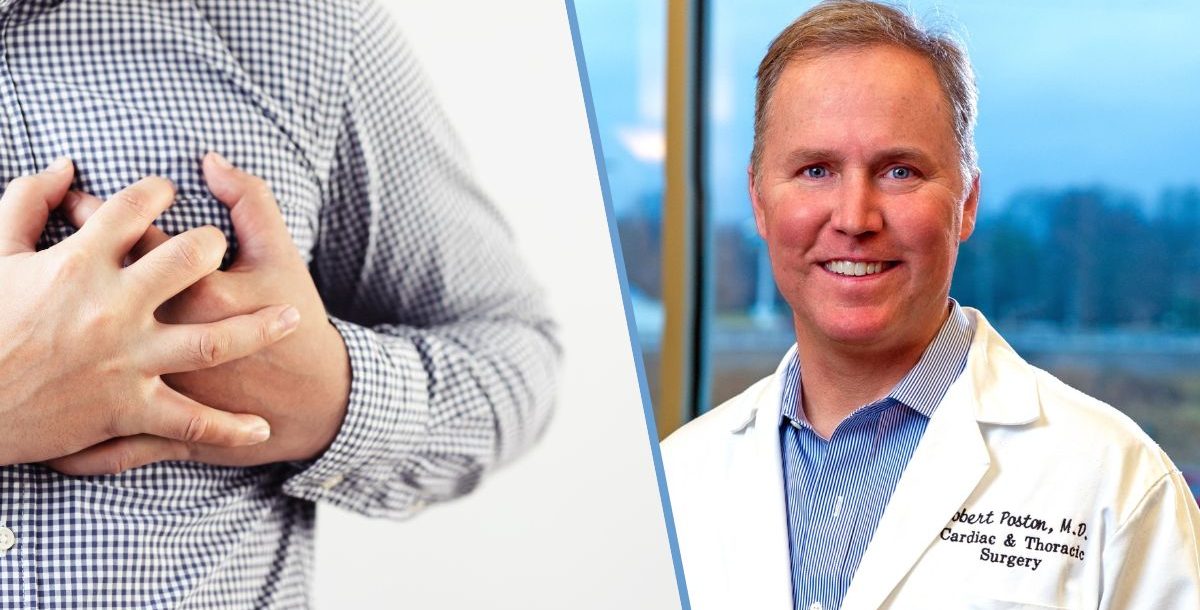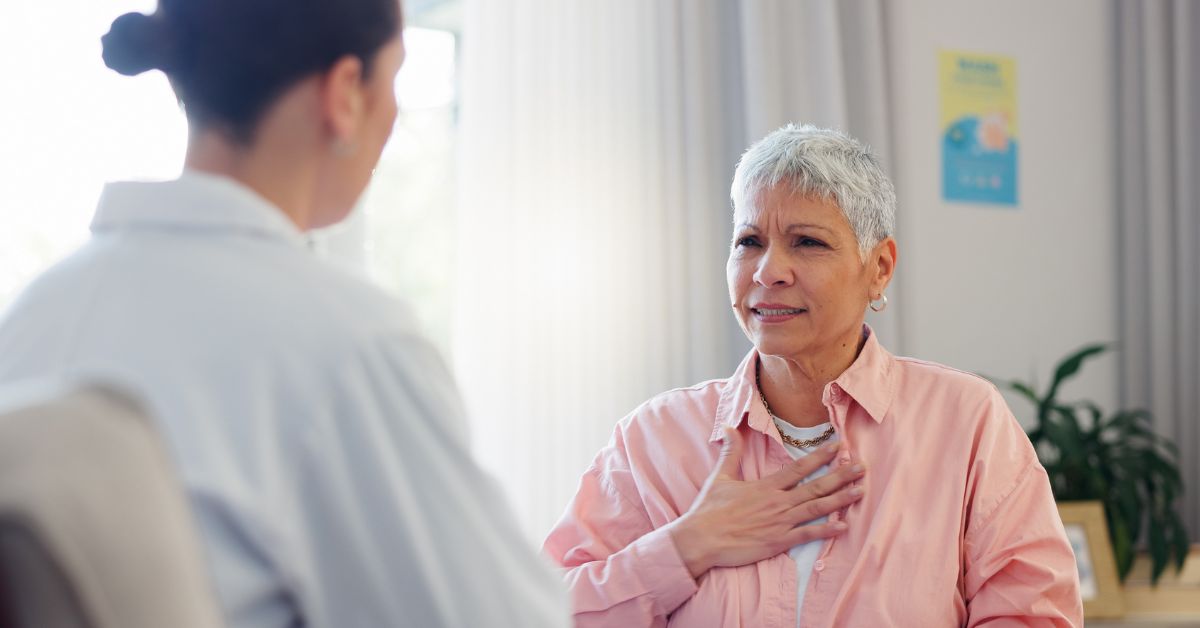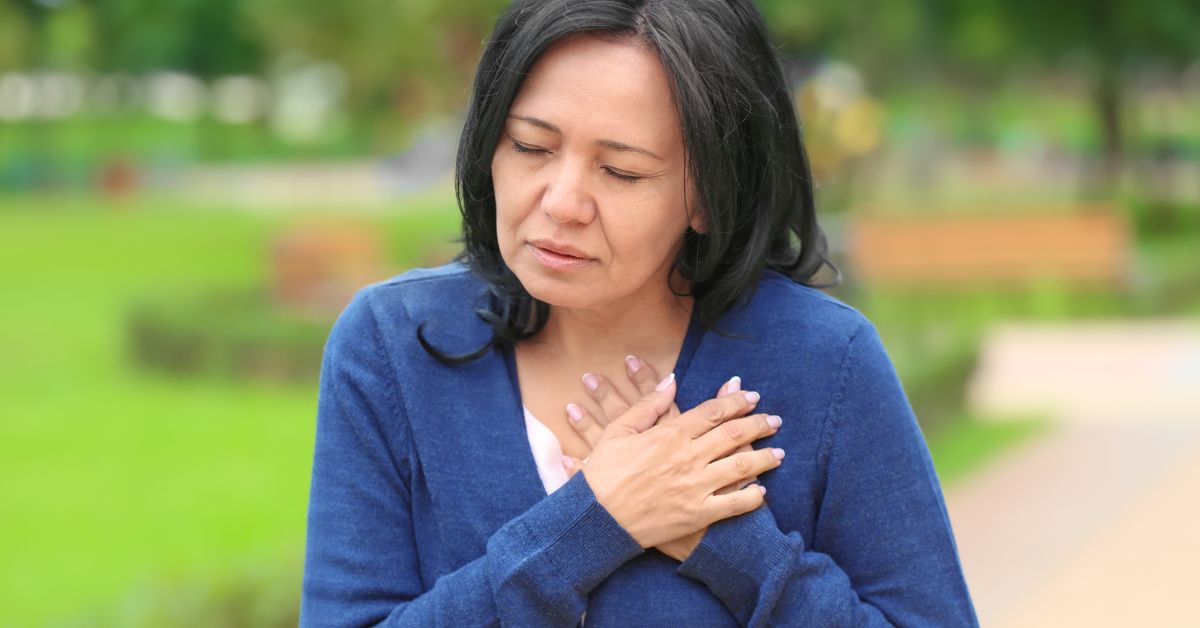Having chest pain can be worrisome.
You might feel sensations of burning, pressure, crushing or fullness, or you may experience a general uncomfortable feeling that tells you something is wrong. There are many causes of chest pain, and in most cases, it’s important to get immediate medical help when you’re experiencing it.
While chest pain can be caused by heart problems, other systems in your body can also create chest pain symptoms you should be aware of. We will examine five common causes of chest pain with Robert Poston, MD, a robotically trained cardiothoracic surgeon in our Paducah market.
1. Heart-Related Causes
Heart-related chest pain, also known as angina, is often characterized by a sensation of pressure, squeezing or burning in the chest.
“The heart is the engine of our body and any issues with it can lead to significant concerns,” Dr. Poston emphasizes.
Angina can result from reduced blood flow to the heart muscle, typically due to coronary artery disease (CAD). Coronary artery disease is the most common form of heart disease in the United States. When it happens, you might experience sharp, stabbing pains. These sensations can spread from your chest to other areas of your body, such as your arms or back.
Heart attacks might be the health condition that people most frequently associate with chest pain. During a heart attack, blood may be completely unable to flow to your heart. This can feel like your chest is being crushed or squeezed. Call 911 immediately if you feel this type of chest pain.
2. Lung-Related Causes
If you experience lung pain, it’s likely that you’ll also feel chest pain. One common cause is called pleurisy. Your lungs are covered in a thin membrane that can become inflamed. When pleurisy inflammation happens, coughing or taking deep breaths can cause sharp pains and tenderness in your chest.
“The lungs play a vital role in our respiratory system,” Dr. Poston states. “Any disturbances here can lead to shortness of breath, discomfort and pain.”
As with your heart, some lung-related pains can require medical attention, such as pleurisy, pneumonia or a pulmonary embolism. A pulmonary embolism, which requires emergency attention, happens when a blood clot forms in one of the arteries in your lungs. Shortness of breath — accompanied by burning, aching or sharp pains in your chest — are symptoms of this.
3. Stress-Related Causes
“The mind and body are deeply connected,” Dr. Poston affirms. “Emotional distress can manifest physically.”
Stress-related chest pain, often linked with anxiety, can mimic symptoms of a heart attack. Extreme anxiety can cause a panic attack, which is a period of severe worry or fear. During a panic attack, chest pain can arise from heart palpitations, shortness of breath and the feeling of being smothered.
When you’re stressed or anxious, you may feel extremely fearful, worried and restless. These emotions can create a feeling of tightness in your chest that makes it difficult to breathe. Deep breathing exercises, mindfulness techniques and seeking professional help for managing stress can be instrumental in helping you through this.
4. Digestion-Related Causes
Your digestive system includes your liver, stomach, pancreas and intestines. While these abdominal organs are responsible for processing the food you eat, they can also create pain in your chest.
“The gastrointestinal system is in close proximity to the heart and pain signals can sometimes overlap,” Dr. Poston explains. “Digestive issues, like acid reflux, gastritis or esophageal spasms, can lead to chest pain.”
Heartburn is one of the most common digestion-related causes of chest pain. It has nothing to do with your heart, though. Instead, it happens when acid comes up from your stomach and into your esophagus. When the acid makes contact with your esophagus tissue, it causes a burning sensation in the upper part of your chest and neck.
Other digestive disorders can also cause chest pain. Your pancreas is the organ that creates the digestive enzymes that break down the food you eat. This organ can become inflamed, which is a condition known as pancreatitis. When this swelling happens, it can cause chest and back pain that worsens when you eat.
5. Muscle-Related Causes
Muscle-related chest pain, often referred to as musculoskeletal chest pain, can arise from strained or injured chest wall muscles.
If you’ve ever lifted weights at the gym before, you might be familiar with what muscle soreness feels like. This soreness can occur in the muscles in your chest when they become inflamed or torn, or when they experience trauma. Even coughing excessively or lifting something heavy incorrectly can cause chest pain related to muscle trauma. It may feel sharp or worsen when you perform movements that engage your chest muscles.
“It’s often wise to consider the musculoskeletal system in some cases of chest pain, especially after excessive muscular activity or injury,” Dr. Poston advises.
Rest, gentle stretching and over-the-counter pain relief may be effective in relieving muscle-related chest pain.
What Should I Do If I’m Experiencing Chest Pain?
- Seek immediate medical attention: If you experience sudden, severe chest pain, especially if it radiates to your arm, jaw or back, or is accompanied by shortness of breath, nausea or lightheadedness, do not delay. Call 911 or go to the nearest emergency room.
- Do not ignore persistent pain: If you have recurring chest pain, even if it’s mild or intermittent, consult a health care professional. Early intervention can prevent potential complications.
- Provide detailed information: When seeking medical help, be prepared to describe the pain, its location, duration and any accompanying symptoms. This information is crucial for accurate diagnosis.
Learn about the heart and vascular services we offer at Mercy Health.






